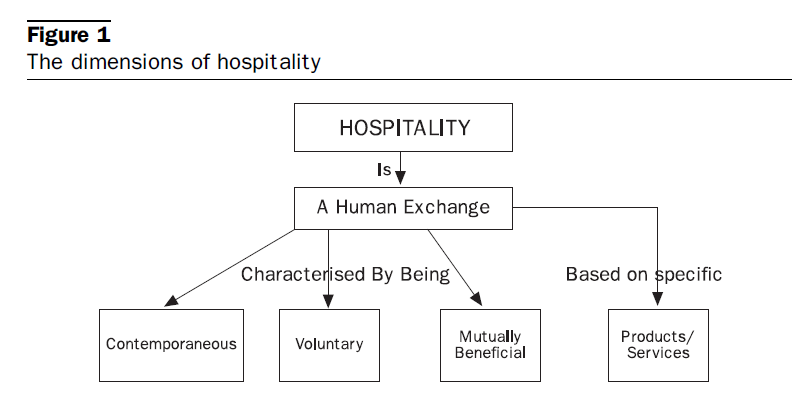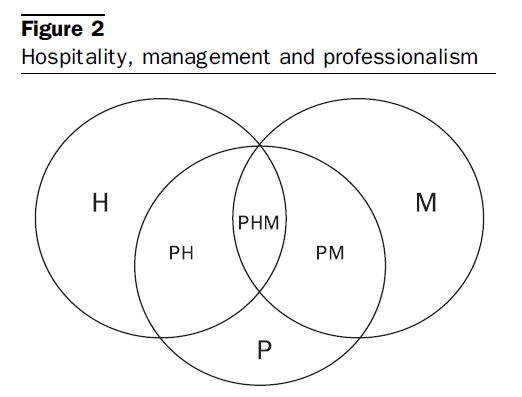Research: Towards a definitive view of the nature of hospitality and hospitality management

Paper (1999) by: Bob Brotherton. Source: https://doi.org/10.1108/09596119910263568.
I have read the paper so you don't have to. The 5 biggest lessons that teach you about the essence of hospitality, tourism and leisure management.
What is hospitality? The term, let alone the concept of, hospitality, is defined and used by most, if not all, hospitality management researchers in a quite indistinct and unsatisfactory manner.
It is also rarely clear where the boundaries of hospitality are drawn in relation to "near neighbours" such as tourism and leisure (Brotherton, 1989), or the structural and behavioural characteristics of other service industries such as retailing, financial services etc., and whether hospitality should be conceived as a product, a process, an experience, or all three!
[This] paper questions the fundamental validity of [...] definitions and perspectives, many of which are frequently accepted as incontestable truths by both academics and practitioners.
What [Academics] have in common is their failure to adequately define hospitality per se. They confuse hospitable behaviour, or hospitableness, with hospitality and fall into the trap of suggesting that one of the important features of hospitality is making the guest "feel at home".
This purported characteristic is so historically and socially value laden, and imbued with totally unwarranted assumptions, that even a cursory examination will find it to be patently nonsensical. In many hospitality situations, both private and public, the last thing which guests or receivers wish to feel is "at home". The whole "feel at home" issue is predicated on the assumption that an individual's home life is akin to some kind of stereotypical middle-class idyll, but if an individual has a miserable home life the last thing they would wish to be made to feel is as though they were at home!
Even if an individual's home life is comfortable, safe and rewarding, a major motive for, and benefit from, staying in a hotel, eating out at a restaurant or someone else's home is that the individual feels different from being at home. There is a novelty value, a chance to do and experience something different, a freedom from everyday home-based routines and obligations, involved in receiving hospitality away from home. Hence, hospitality is invariably designed to make guests feel as though they were not at home, and is desired for this very aspect.
"Hospitality consists of offering food, beverage and lodging, or, in other words, of offering the basic needs for the person away from home".
This type of product-oriented, commercial, supply-side economic perspective tends to dominate in the literature.
The main problems with this type of hospitality definition are first that it concentrates exclusively on one side of the hospitality exchange, and second that it also tends to be one designed to simultaneously define both the concept of hospitality and the nature/parameters of the commercial hospitality industry.
The view that hospitality involves an "exchange" is indisputable, be this of a tangible or intangible nature, or both. However, it is equally indisputable that many other, non-hospitality, activities involve an exchange. The particular nature of the hospitality exchange, which differentiates it from other types of exchange, is partly delimited by the specific product focus associated with the provision of accommodation/ food/ drink but also by this particular type of exchange being "contemporaneous" in nature.
As contemporaneity refers to something which exists or occurs at the same time it therefore indicates the existence of the type of close temporal relationship between the production and consumption aspects of the hospitality exchange.
The definition of hospitality [...] which is favoured by some, though by no means all, of the group of colleagues referred to earlier is as follows:
A contemporaneous human exchange, which is voluntarily entered into, and designed to enhance the mutual wellbeing of the parties concerned through the provision of accommodation and food or drink.

This definition transcends the issues of form, motives, scale, and context and focuses attention on the essential elements of the hospitality concept (see Figure 1). The inclusion, and purposive ordering, of the product parameters (accommodation, food, drink) serves to differentiate hospitality from hospitable behaviour. Thus, for hospitality to exist something more than hospitable behaviour must be evident. It is this "holy trinity" of accommodation, food and drink which facilitates such a differentiation between the two. Without these the definition could be seen to refer to a wide variety of mutually beneficial exchange situations. Hence the product component is an integral foundation of the hospitality concept.
Whatever the context and scale of a hospitality exchange it still needs to be
managed. The key issue here is not necessarily the context of, and/or motive for, the hospitality exchange but the nature of its management. It is the distinction between managing hospitality and hospitality management.
The distinction between managing hospitality and hospitality management, given the generally accepted use of the latter term, lies in the concept of a profession and the existence of a hospitality management profession populated by hospitality management professionals.

Professions have an identity and certain coherence, they stipulate standards
of professional conduct and practice, and are self-regulating. This raises a number
of questions for hospitality researchers and practitioners alike.
How should we distinguish between professional and non-professional hospitality management? Where does the boundary between hospitality professionals and professional hospitality management lie? What distinguishes professional hospitality management from professional management per se? To what extent does the current state of hospitality management practice meet the "normal" criteria associated with the conduct of a respected profession?



